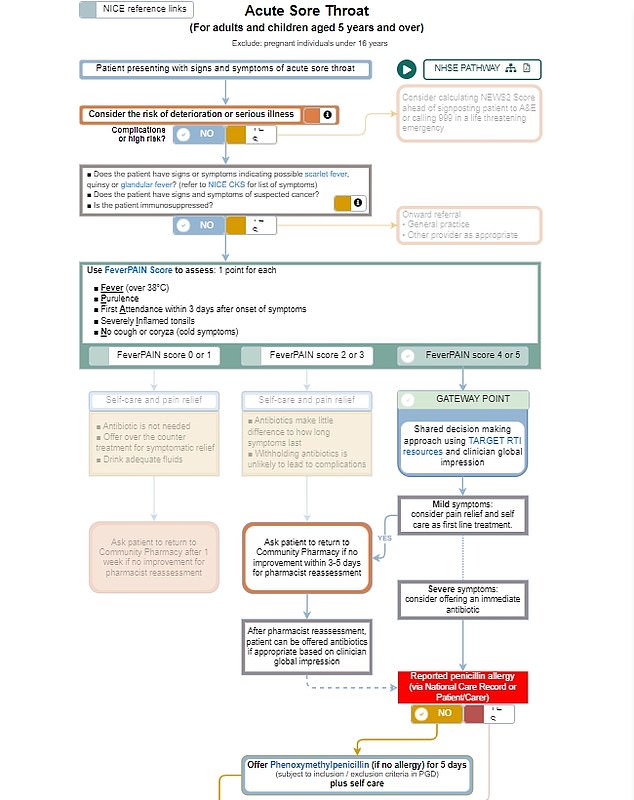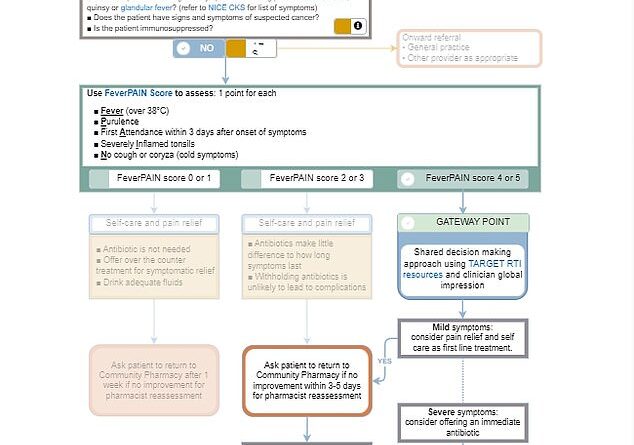Got a sore throat? You pharmacist CAN give you antibiotics, but you will need to answer these five questions first…
It’s sore throat time – including the annoying ones that won’t go away.
But how do you know if your sore throat is just a sore throat that needs nothing but time to heal, or a serious infection that needs antibiotics?
Now, you no longer have to wait for an appointment with your GP to find out.
NHS England’s new Pharmacy First service allows local pharmacists to prescribe medicines for a small number of easy-to-treat conditions, including bites, shingles, urinary tract infections and throat.
Now, MailOnline can reveal a simple test used by pharmacists to find out if your sore throat is not good enough for the prescribed medicine.
The test – carried out by NHS England – gives patients a score out of five based on the presence of five symptoms, and how severe they are.
Symptoms include fever over 38°C, pus in the tonsils, swollen tonsils and cough. Patients get an extra point if they visit a pharmacist within three days of the onset of symptoms.
This is because those with symptoms that have been present for a long time may have a specific problem that requires a referral to a specialist.

NHS England’s Pharmacy First Patient Group Directive gives pharmacists instructions for dispensing medicines to patients in order to free up GP space.
If patients get a score above four, pharmacists will ask how severe the pain is – if it’s mild, you’re told to take paracetamol. But if it is severe, they can give a five-day course of common antibiotics, penicillin – to give the patient not to get sick.
The guidelines also state that, before even considering treatment for a chest or throat infection, healthcare professionals should consider red flag symptoms for other, more serious conditions.
These include scarlet fever, glandular fever, abscess behind the tonsil known as quinsy and other types of cancer.
The test is only used on adults and children over the age of five, and pregnant women under the age of 16 are excluded.
Those who are immunocompromised and considered to be at ‘high risk’ of health deterioration will not be eligible for testing, but will instead be referred for treatment special.
The Pharmacy First program was launched by the government and NHS England at the end of January with the aim of reducing the pressure on GP services.
Recent data from a one-month NHS people’s experience survey has revealed that less than half of patients in England were able to see their GP face-to-face.
Only a third of patients surveyed could see a doctor on the same day they wanted help, while only a fifth said telephone or online contact was sufficient. solve their life problems.
It comes after more than 98 per cent of GPs in England backed the British Medical Association’s (BMA) proposed 25-a-day GP appointment.

Pharmacists can now prescribe medication for a limited number of common ailments including ringworm, shingles, urinary tract and throat infections.
Helen Morgan MP and Liberal Democrat Health and Social Care spokeswoman has argued that the country’s core services are “close to collapse”.
“Patients are left with no choice, instead they let their conditions get worse when they can’t get the care they need,” he said.
Meanwhile, high street pharmacies are struggling with staff cuts and financial problems, forcing many to close, a new report suggests.
Seven out of 10 pharmacy owners also report regular staff shortages, with a tenth forced to close temporarily, according to research by industry group Community Pharmacy England (CPE).
The report comes after it was revealed that the number of pharmacies in England is at its lowest level for almost 20 years, with an average of seven of these essential services closing a week. each one.
More than 1,500 have closed their doors since 2015, leaving just 10,054 open, the National Pharmacy Association warned last month.
At this rate, the number could fall below 10,000 for the first time since 2005, when there were 9,872.
Supermarkets have closed a number of branches in recent months, while LloydsPharmacy has closed its doors entirely.
#sore #throat #pharmacist #give #antibiotics #answer #questions #first..
